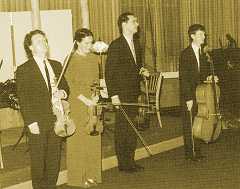Air of another planet
A quarter century of musical conviction
The Schoenberg Quartet celebrates a milestone
Niek Nelissen
Fresh parts for the entrance of Viola de Hoog
 On November 2nd 1989 the Schoenberg Quartet performed in the northern Italian city of Padua. It was to be their last appearance with Hans Woudenberg playing the cello. His illness had necessitated a certain amount of improvisation. Several concerts had to be cancelled and substitutes were sought for others. In 1990 the quartet gave just nine concerts in their own right. Viola de Hoog was asked to deputise for a performance given on December 6 1989. As a member of the ASKO ensemble, she was familiar with 20th-century music. She had participated in performances of Pierrot lunaire with the Schoenberg Ensemble. Viola de Hoog remembers how, a few months later, she was called and asked whether she wished to discuss joining the quartet. “That conversation wasn’t so much about artistic matters – in that respect they felt completely comfortable, I believe – as really about my commitment. During our talk I said I had two wishes: children and quartet playing. I didn’t just want to drop everything. I’ve always found that other things are themselves a source of inspiration. The idea of the four of us playing quartets day in and day out and travelling around the world wouldn’t have appealed to me at all. It turned out that they felt exactly the same way. They were offering a half-time job, alternating with other work.”
On November 2nd 1989 the Schoenberg Quartet performed in the northern Italian city of Padua. It was to be their last appearance with Hans Woudenberg playing the cello. His illness had necessitated a certain amount of improvisation. Several concerts had to be cancelled and substitutes were sought for others. In 1990 the quartet gave just nine concerts in their own right. Viola de Hoog was asked to deputise for a performance given on December 6 1989. As a member of the ASKO ensemble, she was familiar with 20th-century music. She had participated in performances of Pierrot lunaire with the Schoenberg Ensemble. Viola de Hoog remembers how, a few months later, she was called and asked whether she wished to discuss joining the quartet. “That conversation wasn’t so much about artistic matters – in that respect they felt completely comfortable, I believe – as really about my commitment. During our talk I said I had two wishes: children and quartet playing. I didn’t just want to drop everything. I’ve always found that other things are themselves a source of inspiration. The idea of the four of us playing quartets day in and day out and travelling around the world wouldn’t have appealed to me at all. It turned out that they felt exactly the same way. They were offering a half-time job, alternating with other work.”
After joining the quartet Viola de Hoog had to assimilate a large number of compositions within a short space of time. “I had to study extremely hard. I remember going over to Hans to get the parts and coming home with a bag full of music. I practised like crazy and I had to learn the stuff really quickly as plans for television recordings were already in place.” The other three quartet members are still full of admiration for the speed at which she settled in. Wim de Jong comments, “Viola absorbed the music amazingly well. Shortly after she decided to take the job it turned out she was expecting twins. Great that she was able to manage it all. A new addition to a quartet obviously influences the way it works. As Viola expressed her ideas more easily, the others felt less restraint about voicing their opinions. But actually the transition wasn’t such a big one because she had the same approach to the music.”
Viola de Hoog has an explanation for the smoothness and naturalness with which she adapted to the quartet. “What was really good for me was the fact they were wide open to my ideas. New and therefore unmarked parts were bought. It was a new beginning. Obviously I had the feeling that they knew everything about this repertoire and that I had to get as close to that as I could. To begin with I therefore took in everything they themselves had discovered about the music. But if after that you do a piece for the second or third time you obviously start forming your own opinions. I must say, though, that it was never my intention suddenly to try to change everything.” Janneke van der Meer puts into words what Viola brought to the quartet: “I think she plays the bass in a clear way. Particularly in later works by Schoenberg, the bass line is not always apparent. In one way or another she manages to give it a bass-like stability. That was one thing and another thing was that she also used to say occasionally, “Okay you lot, you’ve been doing it that way for 15 years, but why?” It’s good to hear that sometimes.